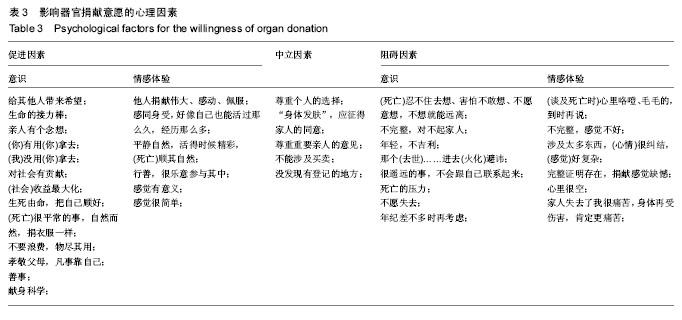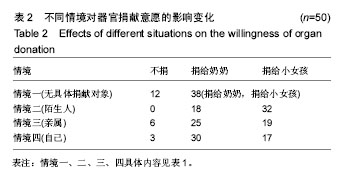中国组织工程研究 ›› 2018, Vol. 22 ›› Issue (4): 600-605.doi: 10.3969/j.issn.2095-4344.0097
• 组织构建临床实践 clinical practice in tissue construction • 上一篇 下一篇
大学生器官捐献意愿的文化心理特征
阎 茹1,2,3,邱鸿钟2,黄 海3
- 1广东外语外贸大学心理健康教育与咨询中心,广东省广州市 510006;2广州中医药大学经管学院,广东省广州市 510006;3广州军区广州总医院,广东省广州市 510010
Willingness of organ donation in college students: cultural and mental characteristics
Yan Ru1, 2, 3, Qiu Hong-zhong2, Huang Hai3
- 1Mental Health Education and Consultant Center of Guangdong University of Foreign Studies, Guangzhou 510006, Guangdong Province, China; 2College of Economic and Management, Guangzhou University of Chinese Medicine, Guangzhou 510006, Guangdong Province, China; 3General Hospital of Guangzhou Military Command of PLA, Guangzhou 510010, Guangdong Province, China
摘要:
.jpg)
摘要 背景:调查显示中国公民对器官捐献的认可程度较高而器官捐献的实际数量较低,除政策、制度等现实制约外,器官捐献仍存在着诸多未被发现的隐性影响因素,其中器官捐献涉及的文化心理因素是研究的薄弱环节,需要加以重视。 目的:通过对大学生群体进行器官捐献模拟情境的现象学研究,分析中国文化背景下影响器官捐献意愿的文化心理因素,探讨促进器官捐献工作的操作路径。 方法:抽取广州某高校应用心理学专业三年级学生50人,其中男女生分别为19人、31人;并与其中8名同学(男生2名,女生6名)进行了深入访谈。采用质性研究方法,运用现象学研究途径,通过有关器官捐献两难情境故事的引入,由研究者对受访对象进行调查和访谈,经过陈述和分析,探索影响大学生器官捐献意愿的文化心理因素。 结果与结论:①捐献情境会影响捐献意愿,其中不同的认知、情绪和情感连接是影响捐献意愿的心理因素,死亡、丧失、避讳、意义和尊重是影响捐献意义的文化因素;②促成器官捐献意愿的文化心理因素包括:物尽其用、顺其自然、有益他人促进自我实现,赋予意义以实现个人希望;③阻碍捐献意愿文化心理因素包括畏惧死亡、文化避讳以及由双重丧失所触发的二次伤害;④捐献工作开展应重视死亡教育、注重文化引导、加强社会支持,实际工作时需尊重重要亲人的意见,尽快完善相关制度。 中国组织工程研究杂志出版内容重点:组织构建;骨细胞;软骨细胞;细胞培养;成纤维细胞;血管内皮细胞;骨质疏松;组织工程 ORCID: 0000-0002-6859-4779(阎茹)
中图分类号:


.jpg)
.jpg)